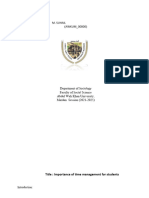0% found this document useful (0 votes)
359 views2 pagesStudocu Upllkoad Hack
This study guide emphasizes the importance of time management for students, highlighting its role in enhancing academic performance and reducing stress. It offers key strategies such as setting clear goals, creating schedules, avoiding procrastination, and maintaining healthy habits. By applying these techniques, students can optimize their time and achieve success in their academic journey.
Uploaded by
Lester SamsonCopyright
© © All Rights Reserved
We take content rights seriously. If you suspect this is your content, claim it here.
Available Formats
Download as PDF, TXT or read online on Scribd
0% found this document useful (0 votes)
359 views2 pagesStudocu Upllkoad Hack
This study guide emphasizes the importance of time management for students, highlighting its role in enhancing academic performance and reducing stress. It offers key strategies such as setting clear goals, creating schedules, avoiding procrastination, and maintaining healthy habits. By applying these techniques, students can optimize their time and achieve success in their academic journey.
Uploaded by
Lester SamsonCopyright
© © All Rights Reserved
We take content rights seriously. If you suspect this is your content, claim it here.
Available Formats
Download as PDF, TXT or read online on Scribd
/ 2


























































